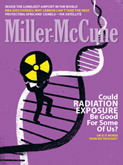Miller-McCune was launched in 2008 to showcase some of the most intriguing academic research being produced in the world today. Our belief then, and now, is that it’s important to publish stories that are research-driven and fact-based, written by journalists, innovative thinkers, and leading academics. In the run-up to our fifth year, we’ve considered carefully where we’ve been and where we’d like to go. And we’ve thought long and hard about the benefits, and pitfalls, of publishing this magazine in California when most American magazines (a few gems notwithstanding) are produced on the other side of the continent.
So we have decided: this will be the last issue named Miller-McCune. The next version you receive in the mail, or explore online, will have an updated look and feel, and a new title.
As we have thought about the future of Miller-McCune, one of the things that came up often was the perch from which we view the world. Our distinctly Western perch.
Since the California Gold Rush of 1849, many of the important events of modern history began in this part of the world. The American West is at the vanguard of technology and science; it is the source of much of our agricultural bounty; it has spawned major political and cultural movements. The state is home to three of the 10 best universities in the world: the Times Higher EducationWorld University Rankings names the California Institute of Technology and Stanford University as the first and second, respectively. University of California, Berkeley, is 10th. (UCLA is 13th.) These, and the many other top academic institutions in the West are part of the world’s new frontiers.
The March-April 2012
Miller-McCune
This article appears in our March-April 2012 issue under the title “New Frontiers” To see a schedule of when more articles from this issue will appear on Miller-McCune.com, please visit the
March-April magazine page.

Our offices are exactly one mile from the Pacific Ocean, facing other emerging frontiers. China is increasingly the driving force of global capitalism. Australia is becoming a financial and resource powerhouse. Indonesia and Thailand are on the rise. North and South Korea are glancing anxiously at each other, maybe with a modicum of hope.
We realize our geographical positioning is as crucial a foundation for our editorial mission as our devotion to research-driven journalism.
Our stories won’t be solely about the West. They will be from the West. Whether we are looking at Beijing, New York, or for that matter Sacramento, we will be doing so from a Pacific perspective and a Western sensibility.
As Bruce Cumings, the chair of the University of Chicago history department, writes in Dominion from Sea to Sea: Pacific Ascendancy and American Power, “The United States is the only great power with long Atlantic and Pacific coasts, making it simultaneously an Atlantic and a Pacific nation. The historic dominance of Atlanticists, gazing upon Europe whose civilization gave birth to our own, averts our eyes from this fact. … In the twenty-first century a Pacific civilization is slowly emerging, linking all sides of the vast ocean in ongoing, daily life exchange.” (You will be hearing more from Cumings in our pages.)
The people and societies on both sides of this ocean are increasingly setting the standards for tomorrow. Which is why the next issue of this magazine will carry the name Pacific Standard.



